Building capacities in India through unlearning, training and sharing
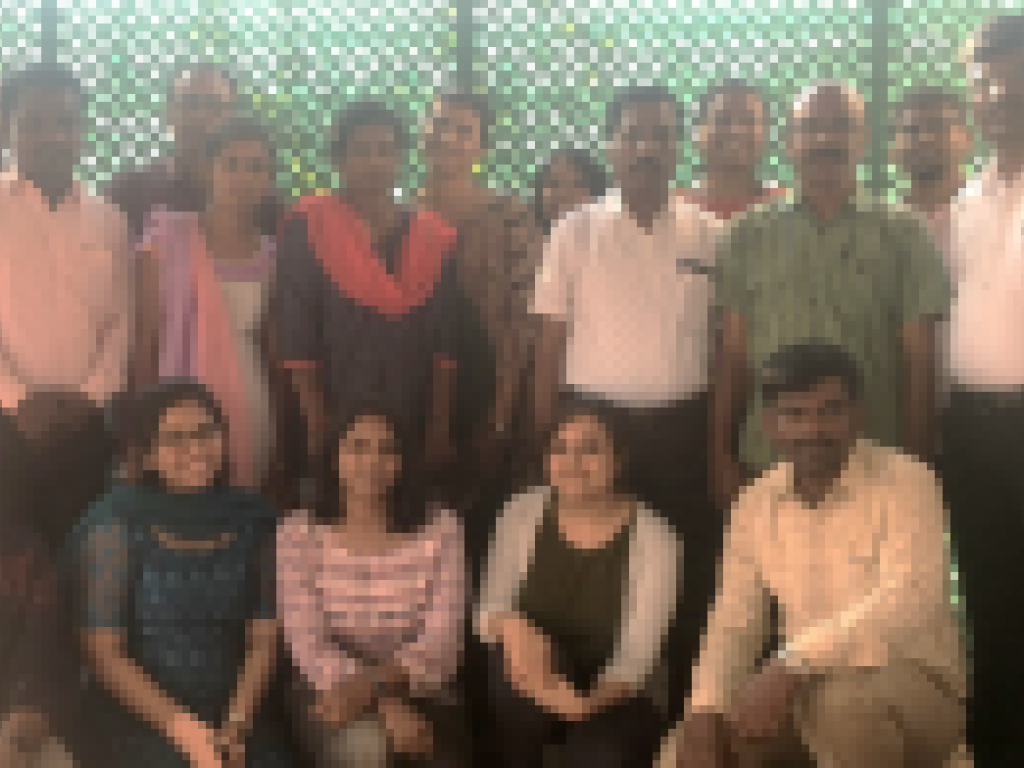
Maitreyi Koduganti from the Indian Institute for Human Settlements (IIHS) gives an overview of a capacity development workshop for integrated climate in development projects, that was conducted in March 2018, in Bangalore, by the IIHS and Ashoka Trust for Research in Ecology and the Environment (ATREE), with the support of an ASSAR Grant for Local Adaptation Support (GLAS).
ASSAR's research in India's regions of Karnataka (in the semi-arid districts of Kolar, Gulbarga, and Bangalore) and Tamil Nadu (in the Moyar-Bhavani sub-basin) over more than three years has highlighted the important role of civil society organisations in supporting vulnerable and marginalised communities to manage and respond to the effects of climate change and other drivers of vulnerability. However, our research has also identified key capacity gaps within these civil society organisations when it comes to understanding the evolving developmental narrative and how to respond adequately to specific barriers to climate adaptation. In response to this need, the IIHS and ATREE jointly conducted a three-day workshop (from 21-23 March 2018) to develop the capacities of community/field workers from select civil society organisations that have had a long presence in our research sites. The workshop was attended by over 20 representatives from the local NGOs of Karnataka and Tamil Nadu – these representatives belong to multiple cadres of hierarchy, ranging from frontline workers to project managers.
Unpacking key concepts
Using the ASSAR research framework as a foundational base and the findings emerging from our research as specific examples, we aimed to develop capacities of the participants along the lines of interconnections and interactions of climate, vulnerability and responses within their regions of work. The workshop was curated to incorporate classroom lessons, and guided practical sessions that would enable the participants to connect climate and development. Since the participants belonged to a multi-lingual background, a translator helped the facilitators to communicate better with the participants.
The sessions on the first day attempted to unpack key concepts of climatic-non-climatic risks and their associated responses, multi-dimensional vulnerability, social differentiation, temporal flexibility, coupled with enablers and barriers to these responses. These concepts were illustrated using the ASSAR research work in form of presentations and videos. Many participants noted that within their work, despite climate being important, they had never imagined climate to be so connected and integral to the changes that happen on ground.
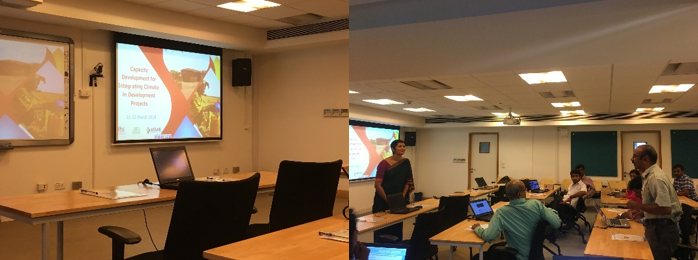
Introduction. (Photos by Maitreyi Koduganti)
Understanding basic climate data
With the key concepts introduced, there was a need to foreground the value of understanding basic climate data, its importance and representation. This knowledge would be essential for the practitioners to access basic climate data, to make a quick analysis of the field conditions and forge climatic trends for their field sites. This was conducted in two steps. At first, climate data expert from ATREE, introduced the basics of climate data with emphasis on precipitation and temperature data through a series of exercises on MS Excel. In the second step, the participants were introduced to multiple sources of open-access climate data that they could use during the course of any of their projects.
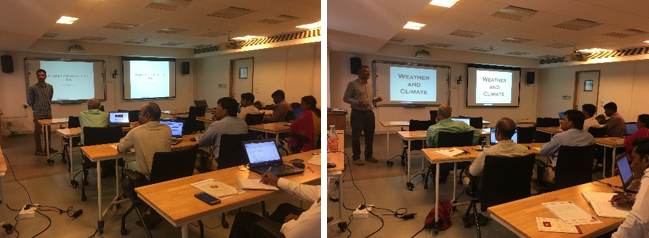
Sessions on Day 1. (Photos by Maitreyi Koduganti)
At the end of the first day, the participants were acquainted with the key concepts of climate science and its relevance in the development sector. To make this learning engrossing, the participants were engaged in playing the Gender Walk and Farming Juggle as tools of experiential learning. These tools ensured a deeper understanding of the concepts, such as differential vulnerability and climate stressors and farmer decision-making, that were introduced during the sessions.

Farming Juggle and Gender Walk. (Photos by Maitreyi Koduganti)
Sharing practical tools and tips
The sessions on the second day focused on providing practical tools for integrating research in practice. Facilitators introduced the participants to the common methods of research followed by means to design and implement surveys for a climate-development project. Processes occurring along the rural-urban continuum were mooted across in the room through a series of case-studies foregrounded in the ASSAR research.
To provide an overview of external funding opportunities, and how to apply for them, the session facilitator shared his experience as a recipient of Rufford Small Grant for Nature Conservation. He touched upon the guidelines and requirements for acquiring various other grants as well. This session aimed to acquaint the participants with the knowledge of external grants that are available which attempt to integrate climate and development. There was also a short session on writing an impactful proposal for climate-inclusive development projects.

Sessions on Day 2. (Photos by Maitreyi Koduganti)
Fun-filled and interactive technology training session
The second half of the day engaged participants on using the ‘Open Data Kit’ (ODK) as a tool for collecting and processing and analysing thousands of survey data, electronically using tablets. Facilitated by ODK experts, this session was aimed at equipping the participants with relevant technologies that would ease their work of surveying and data management. This session turned out to be a fun-filled and interactive session for the participants, where it gave them a platform to experiment, and learn.
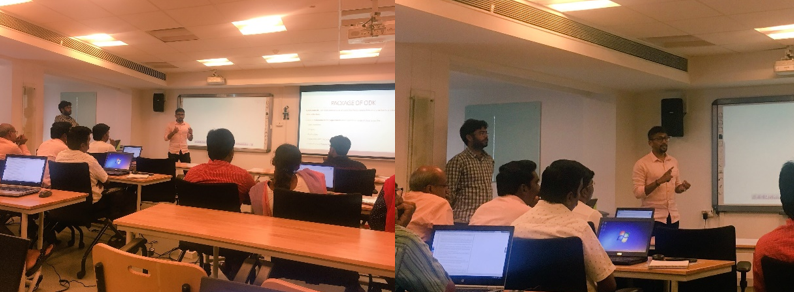
ODK training. (Photos by Maitreyi Koduganti)
Peer-to-peer knowledge sharing
The third day was organised to foster peer-peer knowledge sharing regarding the agricultural practices of progressive farmers in the regions of Kolar and Gulbarga, Karnataka. ‘Adaptation as an innovation’ – a booklet developed by IIHS researchers as part of the ASSAR work – was released during this event, which paved the way to multiple thought-provoking conversations amidst the participants and farmers from these regions. It was interesting to see how this event provided a platform for researchers, practitioners, community members and progressive farmers to share their experiences, learn from one another and foster novel partnerships and networks.
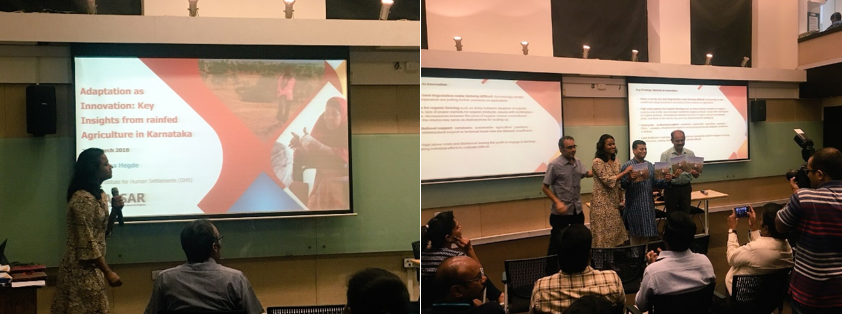
Launch of the 'Adaptation as innovation' booklet (Photos by Maitreyi Koduganti)
Did we achieve what we set out to do?
There is no doubt that the participants have a long-standing presence and relationship with the communities they work in. Very often, these representatives are the first and sometimes the only source of information for many of the communities. Hence, we believe that by developing their capacities, in terms of knowledge and information about integrating the concepts of climate change into development, we are equipping the communities to deal with climate stressors and development challenges. By this means, we believe that this workshop has achieved a certain level of success in terms of enabling the participants to think critically about combining their activities while integrating the concepts of climate change and climate variability for addressing developmental challenges. It managed to provide a platform for conversations and discussions that enabled a collective understanding of the rural and the urban as a continuum of livelihoods, material flows, ideas, people and trade-offs. The workshop was also highly appreciated by the participants for both its intent as well as content, especially for the practical skills that the workshop provided to its participants. The workshop ended with a commitment to foster these novel networks that would ensure transfer of knowledge, experiences and wisdom in the realm of climate and development across communities of practice.
Some reflections from participants
"The need for such networking and sharing experiences is vital for practitioners like us, as it will help us interact with researchers on one end and with the communities on the other end."
"I never realised that playing games also has the capacity to teach concepts in a simplistic manner. Innovation and creativity is quite important to tackle challenges as complex as climate change."
"I feel extremely overwhelmed to be a part of this workshop. It helped me to acquire a broader understanding of climate change and its impacts on communities."
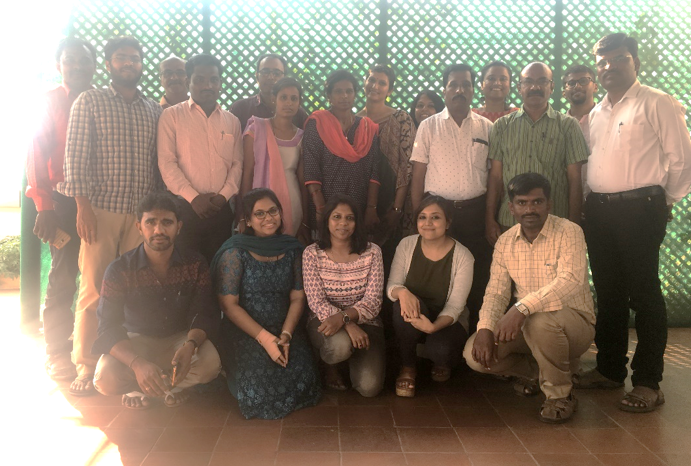
The workshop participants. (Photo by Zohrab Reys Gamat)